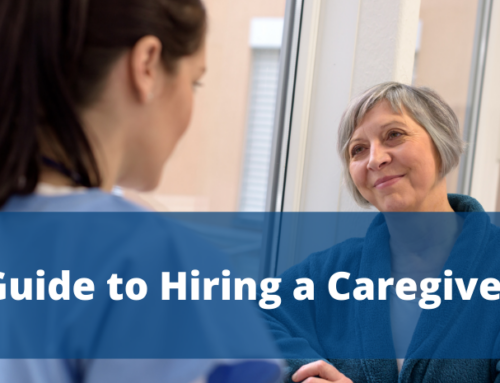It’s that time of year again. Temperatures are falling, days are getting shorter, and you’re gearing up for a holiday visit with your mom and dad. Holiday traditions are a beautiful thing, but if your loved one has declined mentally or physically over the last year, then there might be some other emotions mixed in with all the joy and merriment. For some adults with aging relatives, the holidays highlight symptoms of decline or draw attention to their need for increased care.
How can you enjoy the holidays with your senior loved ones?
It can be difficult if your loved one is declining either mentally or physically, especially if you haven’t seen them in awhile. Preparing yourself for your time together, as well as what you may encounter, can be helpful as you head into the holiday season.
Signs to Look for to Determine If Your Family Member Needs Home Care
If it’s been a while since you’ve seen your loved one in person, you may quickly begin to pick up on signs that their mental or physical health just isn’t what it was a year ago. It can be difficult to arrive home for the holidays and discover that your parent can’t move as easily as they did a year ago or their memory isn’t what it used to be. Or, perhaps you are their regular family caregiver, but holiday stress is bringing out a side of your loved one you just haven’t noticed before.
It’s natural to become alarmed, but important not to panic. Here are a few red flags to look for when visiting your parents.
1. Mobility
If your loved one appears to be in pain while they’re moving, or they avoid standing and moving around the house, then this may be a sign of a problem. Perhaps they seem to be unsteady or report a recent fall. All of these may be signs that they’re at risk of falling, or they can no longer move freely enough to take care of themselves on a day-to-day basis. Gently, but intentionally, inquire about their struggles and find out if they’re under a doctor’s care or would like help making an appointment to determine what the problem is.
2. Weight Loss

Weight loss is a huge red flag because it’s associated with several mental and physical conditions. If your loved one appears significantly thinner than the last time you saw them, it could mean that they’re suffering from a physical ailment. Weight loss can also be a sign of dementia or depression or can signal that they no longer have the energy or mobility they need to fix regular healthy meals for themselves. In some cases, you may be able to watch your loved one and identify the source of the problem — such as fatigue. In other cases, you may need to sit down and talk about what’s been going on.
3. Home Environment
Be on the lookout for drastic changes to their homes. Is your father’s hamper overflowing? It could be a sign that he’s unable to carry laundry to be washed. Are there scorched pans and unwashed dishes in your mother’s sink? This could be a sign that she’s been forgetting food cooking on the stove or can no longer handle doing dishes. Also look for piles of unopened mail, unusually dirty spaces, expired food or prescriptions, or other signs that they can’t care for themselves and their home as they once did.
Remember that your loved one will do everything they can to convince you that they’re still the strong, capable person you remember. It’s up to you to provide them with a listening ear and compassion as they share what they’ve been experiencing.
4. Emotional Behavior
Even if you talk to your loved one on a regular basis, you won’t always be able to gauge their physical and mental condition over the phone. The same is true with their emotional wellbeing. Take note of their emotional state during your visit. Are they easily agitated? Forgetful? Withdrawn or showing signs of avoiding social situations? Having problems sleeping? There can be a variety of causes for these changes in behavior, but all can signal that additional help is needed.
5. Safety
No one wants to leave their home. So declining seniors will do their best to cope where they are, sometimes at risk to their own personal safety. Does your loved one avoid going down to the basement to do laundry? Have they started sleeping on the first floor to prevent a fall down the stairs? Are they avoiding a regular shower because they’re afraid of slipping in the tub? They may be reluctant to admit their fears, but take notice of their habits, especially if these habits are new or signal avoidance of a location or activity inside of their house. Ensure elderly safety during the holidays by identifying potential hazards and working together to remove them or adapt them.
Tips for Making Holidays Easier and More Fun With Seniors

Even if you have a close relationship with your loved one, it’s natural to feel some hesitation or uncertainty about how to act around them during the holidays. They may not be able to do all the things they used to do or engage in all the family traditions you’ve come to expect, but that doesn’t mean that the holidays can’t still be a fun, memorable time for everyone. What does holiday senior care look like?
1. Find Activities They Can Do
Although they may not move as quickly as they once did or arthritis may limit their ability to tie a bow, there are still plenty of seasonal activities to do together.
- Arranging flowers
- Helping with Christmas tree decorations
- Sorting out silverware
- Folding napkins
- Greasing pans
This is also a great time to highlight their role as a family mentor and teacher. Is there a beloved family recipe they can no longer make on their own? Ask them to teach you how to do it! Is there a particular holiday carol they always sang when you were a child? Ask them to teach you the words so you can pass it on to the rest of the family.
2. Shift Their Focus
Older adults often struggle during the holidays because they are bombarded with memories of loved ones who have passed away. It’s only natural that they would miss a spouse or a sibling who is no longer present. However, it’s important to help them find productive ways to channel their grief. So, find ways to honor the memory of their loved ones. Perhaps you make a special holiday wreath and light a candle in their honor. Or, maybe you bake their favorite cookies and then eat them while you look at old photos. Whatever you opt to do, remember to keep the focus on celebrating life. This will allow your senior loved one to remember but keep their focus more positive.
3. Make Senior-Friendly Foods
Some seniors struggle with certain traditional holiday foods, particularly if they wear dentures. Or, their health may prevent them from being able to consume the large quantities of salt and sugar that are often present in holiday classics. As you’re planning your holiday meal, take your loved one’s needs into consideration. Limit the amount of salt and sugar you use, and be sure to provide plenty of healthy alternatives. Also, be attentive to their needs at the table. If your loved one struggles to chew and swallow, they may need help choosing soft foods or cutting food to make it more manageable.
If you aren’t sure how to approach this, be honest with your loved one and incorporate them into meal planning if you can. This gives them a way to feel involved and ensures they’ll enjoy the meal like everyone else!
4. Don’t Miss the Sights and Sounds of the Season
Everyone has an event or activity that really enhances their enjoyment of the holidays. Make sure to help your loved one engage in that activity so they can still enjoy the holidays as they have before. Perhaps it’s taking a carriage ride through a holiday light display or serving together at a local soup kitchen. It could mean watching a certain holiday movie or playing certain songs on the piano.
5. Offer to Help With Gifts
Even older adults love to shower their loved ones with gifts during the holidays. But, shopping for and wrapping gifts can be a struggle, especially if their mobility is limited. Volunteer to help them make a list of the gifts they want to buy, then take them to the store or, if they can’t leave the house, offer to purchase the gifts for them. Then, help them wrap the gifts and either mail them or help make sure they show up at the family celebration.
6. Make Traveling Easier
If you’re planning holiday travel with senior loved ones, then it’s important to keep them as comfortable as possible. It’s also important to make sure you can still enjoy your holidays. So how can you do that? Pack all of their medications, as well as any assistive devices, such as a walker or cane. If you’re traveling long distances via car, you’ll also want to pack blankets and a pillow to help keep them comfortable. And take your travel plans slow. Don’t try to make a 10 hour trip in a day. Instead, plan a slower trip or, if possible, plan a family visit somewhere in the middle.
7. Don’t Be Afraid to Ask for Help
Although last on the list, this one is the most important. You want your loved one to feel comfortable asking for help when they need it. You need to model that by asking for help too. There’s no shame in admitting that you are tired or you need a home care provider to help shoulder the responsibility, especially so you can enjoy the holidays with your senior loved ones.
Benefits of CareGivers of America
So you’ve decided your loved one needs more assistance than you can provide, but you want to help them stay in their own home as long as possible. Relying on an experienced, trustworthy home care provider is a great way to do this. Providing services in Monroe, Broward and Miami-Dade Counties, CareGivers of America provides referrals for home care providers who will help your loved one weather the holidays in fine fashion. We refer caregivers who can provide a variety of home care services.
1. Live-In, Overnight and 24-Hour Care
If your loved one requires around-the-clock care, then consider live-in or 24-hour care. Live-in care means that they’ll be cared for by the same caregiver who stays in their home and assists them with a variety of needs. Twenty-four-hour care provides the same number of hours of care, but the care may be split between several different providers throughout the 24-hour period.
2. Respite Care
There’s nothing nobler than deciding to care for an elderly loved one in your own home. But, as a full-time caregiver, your personal needs are more important than ever. You need to schedule a time to leave the house, visit friends, go shopping or even just take a nap. And this is even more critical around the holidays. Respite care is designed to give you a break. It can be scheduled for a few hours at a time or even a day or two so you can get away and recharge without worrying about your loved one remembering to eat, bathe or take their medications.
3. Personal Care
Our personal care services are designed to cover the ever-changing needs of running a household, such as a weekly trip to the grocery store and transportation to and from doctors’ appointments. Over time, this may adapt to meet your loved one’s changing needs, including meal prep, cleaning or laundry.
4. Alzheimer’s and Dementia Care
If your loved one has been diagnosed with dementia or Alzheimer’s, this doesn’t mean they must immediately move. In fact, with proper care and support, they can maintain their routine at home. Even with medication, your loved one will likely need daily care, including reminders to take medicine and assistance with certain daily activities. Hiring a home care provider who is experienced in working with Alzheimer’s and dementia patients is important because they know how to gently and compassionately work with your loved one as their disease progresses.
5. Parkinson’s Disease
An elderly adult suffering from Parkinson’s Disease may require assistance in a variety of different areas, including taking medications, bathing, dressing, companion care and housework. Acknowledging the challenges that come with various stages of Parkinson’s Disease, CareGivers of America works to connect you with the right nurses and home care providers to make sure that your loved one’s personal needs and challenges are addressed.
6. Companion and Homemaker Care Services
In some cases, your elderly loved one may require daily assistance to maintain their quality of life. For example, if your mother loves gardening, she’s probably not going to give it up. So, hiring a companion to garden alongside her and make sure she’s safe is a great alternative to worrying about her safety. Or, perhaps your father shouldn’t be driving, but he’s still eager to continue his volunteer work at a local library. Companion care provides him with the assistance he needs to continue to lead an active life without worry for his safety.
Homemaker care is designed to provide cleaning services, meal prep and even someone who can oversee minor house repairs, such as plumbers and electricians who might be called when a problem arises.
Ensure Elderly Safety During the Holidays
At CareGivers of America, we provide reliable home care services for aging-in-place seniors, backed by a compassionate approach that’s designed to maintain both qualities of life and peace of mind. As a fully licensed and insured home care agency, the carefully screened aides we refer perform duties ranging from personal care, companionship, and light housework, to transportation, meals, and medication reminders.
We also accept most insurance plans, including Medicare, Medicaid, and LTC insurance. To learn more about CareGivers of America now, or to schedule a FREE in-home assessment for a senior in our service area, please visit us today at: caregiversofamerica.com!







